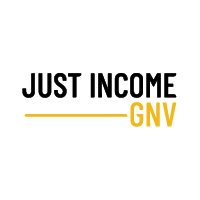
too poor to be free
Fines and fees tied to the justice system keep people trapped in poverty.
Former prisoners face overwhelming debts, including supervision costs, urinalysis, electronic monitoring, and mandatory classes. If these payments cannot be made, the person can be re-incarcerated. People quickly become trapped in a revolving door of poverty and incarceration.
They are, in essence, too poor to be free.
In Alachua County, Florida, 23% of felony probation violations from the Department of Corrections are due to a lack of money.
Explore this e-learning platform, designed by formerly incarcerated people, to see how an income floor can mean the difference between freedom and return to a cage.
“ReEntry”, Just Income’s e-learning platform takes you on a journey through life after incarceration while on probation. How will you handle the hurdles and demands?
Challenges persist long after release from prison, as stable employment and housing—critical for successful reentry—remain elusive for former prisoners. Compounded by the enduring psychological effects of incarceration, these hurdles can have a lasting impact on former prisoners and their families.
Even after 4 years post-incarceration, 65% of people do not have a job.
As the data show, not only is reentry difficult in the first months of release from prison, but the struggle to find a job actually grew over time for the study cohort of people leaving federal prison in 2010. We show these increasing jobless rates next to one of the most dire economic moments of recent years — when the US unemployment rate reached its highest point of around 15% in mid-2020.
formerly incarcerated people are almost 10 times more likely to be homeless than the general public.
2% of formerly incarcerated people were homeless in 2008 (the most recent year for which data are available), a rate nearly 10 times higher than among the general public.
Sustained financial support, like a guaranteed income, enables formerly incarcerated people to make forward-looking decisions, take a breath, and regain control of their lives, significantly reducing the risk of re-incarceration.
Our guaranteed income program has cut money-related probation violations by 43%, highlighting the transformative impact of financial stability.
With a guaranteed income, recipients can improve their circumstances while prioritizing well-being. For many, this is not just reentry but entry with resources for the first time, fostering optimism and community connection. The positive impact extends beyond individual lives, translating into broader benefits for the community, such as reduced financial strain, lower crime rates, and overall stronger bonds.
Resources to learn more
too poor to be free
In this two-minute video, experience some of the realities people face after incarceration. If you can’t get enough money, you can be sent back to prison.
IT’S BASIC
We were featured in the award-winning film, “It’s Basic” by Marc Levin which highlights guaranteed income work around the country, including some of our recipients.
Interested in hosting a screening of the film? Contact us at info@csgnv.org.

Nobody should be too poor to be free
Join us in creating a future where your bank account doesn’t determine your freedom.
Please donate to support out work.




![[Guaranteed income] helps me monetarily afford food and helps me to be able to move around, maneuver, submit resumes, so on and so forth. I don't have to worry about committing another crime just to support myself.](https://images.squarespace-cdn.com/content/v1/612f79826c03b528e62dcbc7/e064f718-6dfa-45ea-85eb-01c70e768cba/%5BGuaranteed+income%5D+helps+me+monetarily+afford+food+and+helps+me+to+be+able+to+move+around%2C+maneuver%2C+submit+resumes%2C+so+on+and+so+forth.+I+don%27t+have+to+worry+about+committing+another+crime+just++%282%29.png)

